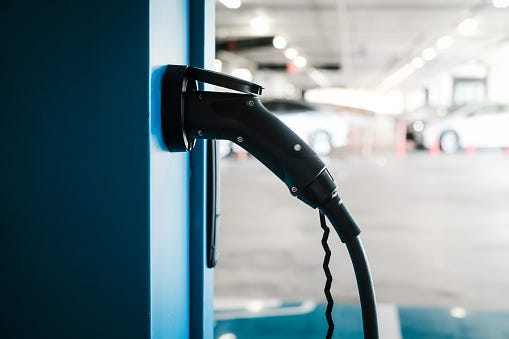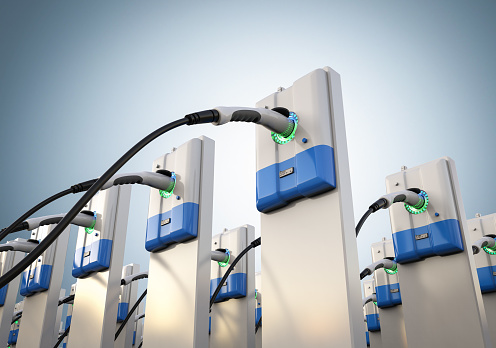Some say EVs should be completely free and others say they are destroying the planet and consumers’ pockets even more.
Sadly in this capitalistic society, EVs won’t become free and certainly aren’t disappearing with the reliance on one powerful entrepreneur charging the way.
No pun intended.
The stock market, environment, and Elon wouldn’t approve either.
Saving the environment is no cheap task.
It requires a lot of manpower, time, energy, savings, charging stations, learning curve, resources, and batteries. Yes, lithium batteries are in fact destructive for the earth and power EVs (electrical vehicles). They are as bad as gas but there is an ongoing toss-up with batteries in terms of the harmful chemicals and toxins they produce.
Since they take more energy to manufacture than gas-powered cars, EVs are seen as an appealing climate change fix to “go to the moon” or maybe that’s Dogecoin. Anyways, both of Elon’s prizes aren’t great for the environment. One requires mining and the other destructive batteries. However, to stir the debate even more between gas and EV vehicles, electric cars do produce less polluting emissions over their lifetime but of course, there’s a cost to it.
Overall, compared to gas-powered vehicles, electric vehicles are better for the wallet and environment. They are much more efficient than fuel-burners but still require a ton of energy which is through lithium batteries. These batteries, not the ones used to replace a lightbulb, aren’t cheap. A typical EV battery pack is a couple of meters long. Inside a battery are essential metals such as cobalt which hike up the price for batteries. Cobalt is at the core of the lithium-ion batteries used in EVs and hybrids. Carmakers pay much less for this metal but retailers and car dealers charge over double to make a substantial profit margin.

Drive-Thru
Despite batteries being harmful to the environment, EVs have seen a meteoric rise in the last few years, predominantly during the pandemic as car registrations have risen due to fear of covid transmission on public transportation. People upgraded their homes, cars, technology, assets, mindset, beach homes, offices, jobs, and lives by investing in themselves, not so much the environment. EVs aren’t a top consideration due to the environment. Saving the planet is just a nice perk and added benefit to the luxury of battery-powered driverless modern silent vehicles. People, especially students are obsessed with brand equity. Tesla is a convenient way to advertise saving the planet.
Consumers have been relentless shoppers since fiscal and monetary stimulus was delivered in Q2 2020 and although sustainable investing through ESG and the edible-packing revolution are big motivators to combat climate change and focus on COP26 efforts, they didn’t stop consumers from consuming big time.
Inflation hit a 40-year record high and I predict supply chain disruptions to cool down but not to the point where demand will tame. Inventory is at its lowest point in 30 years and home builders, suppliers, and labor costs are shooting through the roof. After lumber slumped to 50% from its peak, it bounced back 30% all of a sudden!
Spending in the EV space can be as disastrous for the planet as using a gas-powered car especially if the purchase is used with Bitcoin which may become a reality in the near future, something touted by Musk earlier this year than abruptly pulled away from until promoting it shortly after once again.

The True Cost of EVs
There’s no doubt everything is more expensive these days, including EVs. Anything that has a sustainable impact tied to it, is more expensive. Saving the planet comes at a cost.
There are more dollars chasing not enough supply and vehicles have been a big part of rising inflation and low inventory with buyers pricing out weaker buyers with homes and cars. I know a few folks who purchased a home via Redfin and a car via Carvana without even stepping in or test-driving them! Getting a good deal in the markets is difficult these days and it’s the same with vehicles. According to Bloomberg, inexpensive new cars have pretty much vanished in the U.S. In 2012, more than 50% of new vehicles sold were priced below $30,000. Last year, more than 50% of vehicles were priced above $40,000.
When it comes to helping the planet, every action counts but not every action is actually helpful. With volunteering, you must give up something to give back in return. Since our time is our most precious commodity, volunteering is usually the hardest to encourage long-term. That’s why the wealthier one is, the less incentivized they are to volunteer and give up their precious time, although they make the most when they aren’t physically working and instead earn passively through their business ventures and investments in their sleep. The more privileged could physically volunteer the most yet it tends to be the opposite. They would prefer to donate a lump sum to a charity of their choice for tax benefits and praise. Gifts/donations are usually not anonymous to prove they are a generous citizen, the opposite of true volunteerism, and to ‘help the planet’ that way through donations. Another self-promoter is starting a foundation where one has discretion over their investment choices. ESG at this moment in time is a low-value add field. It will take a while for investors to be interested in pouring their money here. As all investment managers know, they are focused on alpha and their clients. Last but not least another hidden way to save the planet that people in droves have engaged in but haven’t proven any benefit in is buying an EV, a.k.a Tesla which seems mainly for show.
Getting EVs on the road is already a hurdle that is built into the cost.
Electric vehicles are usually more expensive than gas-powered vehicles. Their prices run around $30-$40k but the upfront cost to learn how it works and find gas stations may be a pain and add an invisible cost as time = money.
Despite the learning curve, charging ports that can range in the $5–10k range, and initial deposit, they’re more affordable than gas-powered cars. For one, fuel costs are lower. Gas prices have been the main contributors to inflation and in NY state it costs around $4 per gallon. In California, it’s around $7.03 a gallon! Many of my colleagues have switched to EV vehicles, most prominently Tesla and hybrid models such as the Hyundai and Toyota. Hybrid models run on a combo of gas and electricity. Electric cars on the other hand solely run on electric motors and rechargeable batteries.
Kelley Blue Book (KBB) is a helpful guide when conducting research. It provides the 5-year cost of ownership for the most popular car models sold in North America.
Looking at KBB’s calculations, we can see that the 5-year cost of the bestselling Tesla Model 3 is $43,184, which makes it competitive with entry-level luxury cars such as the Acura ILX. The cheapest EV to own is the 2022 Nissan Leaf, which has a 5-year cost of $30,543 — about the same as a Honda Civic.
Although the KBB guide is a useful tool, no pun intended, it isn’t enough since it doesn’t consider all the options associated costs of charging an EV from home which includes upgraded wiring and charging installation that can add up to around $5k and upgrades that can go over budget.
These are the top-rated 2021 EV + hybrid models:
EVs:
-Hyundai Ioniq Electric
-Tesla Model X
-Tesla Model S
-Porsche Taycan
-Hyundai Kona Electric
-Audi e-tron and e-tron Sportback
-Nissan Leaf
Hybrids:
-Honda Clarity
-Toyota RAV4 Prime
-Ford Escape
-Chrysler Pacifica Plug-In Hybrid Minivan
-Hyundai Santa Fe
-Kia Niro
-Audi A7 55 TSFI e Quattro Plug-In Hybrid

Pump It Up
It costs roughly $300-$400 per year to charge an electric vehicle, and $1-$2k per year to fill up a gas-powered vehicle. Alongside this, electric vehicles are overall easier to maintain and service since they run on batteries with fewer moving parts and no oil change needed. This can help reduce the cost of car insurance, especially if you don’t drive as frequently.
One pain to keep in mind with an EV vehicle is the inconvenience of trying to find a power station. Although there’s been a massive craze and popularity for EVs, especially in the market this year with Lucid and Rivian Motors, two EV car/truck manufacturers that have soared in their market debut and are worth more than Toyota, GM, and Ford that have been around for centuries, charging stations are not nearly as prevalent as gas stations. It is recommended to use electric vehicles for smaller tris not long road trips for this reason so you don’t panic in a remote location! Depending on the type of charging station, it can take 10 to 8 hours to charge one’s car as well!
The easiest and most convenient way to charge your car is overnight at home. Some utilities even have special low rates for the overnight period when their demand is lightest. This will directly impact your electric bill and it’s important to understand how much energy costs there are in your location. Those living in New England such as Massachusetts, New Hampshire, Connecticut, and Rhode island pay nearly double for each kWh of energy than those in Texas, Nevada, Colorado, and Tennessee.
For faster-charging systems which are around Level 2 and Level 3, they can be installed in your garage. They will estimate to be around $2k for parts and installation. Moving up levels reduces your wait charge time but not bill. Don’t forget, once you eventually plan on selling your home or apartment that offers EV charging stations, it will increase the value of your home!
No matter what car you end up getting, what’s evident for all is once you drive them off the lot, they depreciate. Guaranteed. Unlike real estate where you can depreciate the expenses on the property as it appreciates, cars lose half of their value within a few years due to safety, quality concerns, and new models that are constantly coming out. Especially within EV and hybrid models that are dependant on the latest technology with their driverless tech, cruise control, and lithium up-to-date batteries, they could lose as much as twice their purchasing power within a year! Unfortunately, for millions of Americans, there’s no real way of living without a car so finding a bargain that actually works can be challenging especially today with limited options and bidding wars.

The Smart Drive
Considering the cost of ownership of a car requires a future outlook on expectations and usage. If you are debating on leasing or owning, then EVs or hybrids may be a better choice short-term since charging is less expensive for a couple of months to a year and it may be more convenient to find a charging station if you don’t drive frequently, the main reasons for leasing.
Leasing is renting. You get nothing in return and just drop off your keys to something you’ve spent thousands of dollars on trying out. For those with a net worth 3–5x more than their earned income, this may be worth it like buying utility, renting luxury but to most, leasing, especially a car is a total waste of money since most of the time if we need a car, we will need it longer than just a few months but of course, everyone has their reasons and might not want to jump to buying a depreciating asset right away.
Something to consider about leasing is that the demand for test driving an EV is low. Hertz recently partnered with Tesla to offer EV rentals but for the time being, in terms of securing a lease for a couple of months, it may be difficult or nearly impossible to lease an EV since they are in short supply and reserved for buyers instead — their target audience who will obviously pay more to keep it.
Considering the 5-year cost of ownership is a good ballpark. No more or less since renting can pay off if kept for the sweet spot of 5 years. In short, the cost of ownership measures the full financial impact of a purchase over a 5-year period and factors in the purchase price, ongoing maintenance, fuel, insurance, registration costs, and the hit of depreciation if you decide to sell the car.
Buying a car is no easy task. It is made to be complicated since there are not only so many options to choose from which messes up our psychology and prevents us from thinking straight, but too many features, add-ons, offerings, and negotiations taking place prevents us from enjoying the process. Enjoying a leased car is arguably the most difficult.
No matter what happens, you will still end up paying more for the vehicle than what you end up selling it for. We all have to succumb to that realization. It’s a painful truth. Money has to be spent somewhere! At least it’s used effectively in this case not a pair of shoes sitting in the closet for 2 decades.
Looking at the larger picture and your circumstances, if you want the most bang for your buck in the short term for less than 5 years, EVs remain slightly more expensive than comparably sized and optioned gas-burning cars but over 5 years, the prices will flip.
Yet as EVs advance and become more mainstream, prices will lower even as inflation has hit its 40 year high to 6.8% in November. EVs aren’t just for the hipster Silicon Valley engineers or Greta Thunbergs.
They are made for everyone and a nice badge of honor to show you at least put some thought into the environment in some way. Or you may just be an avid Twitter supporter for Elon.
At least you support something rather than a 20th-century gas-powered car manufacturer?

